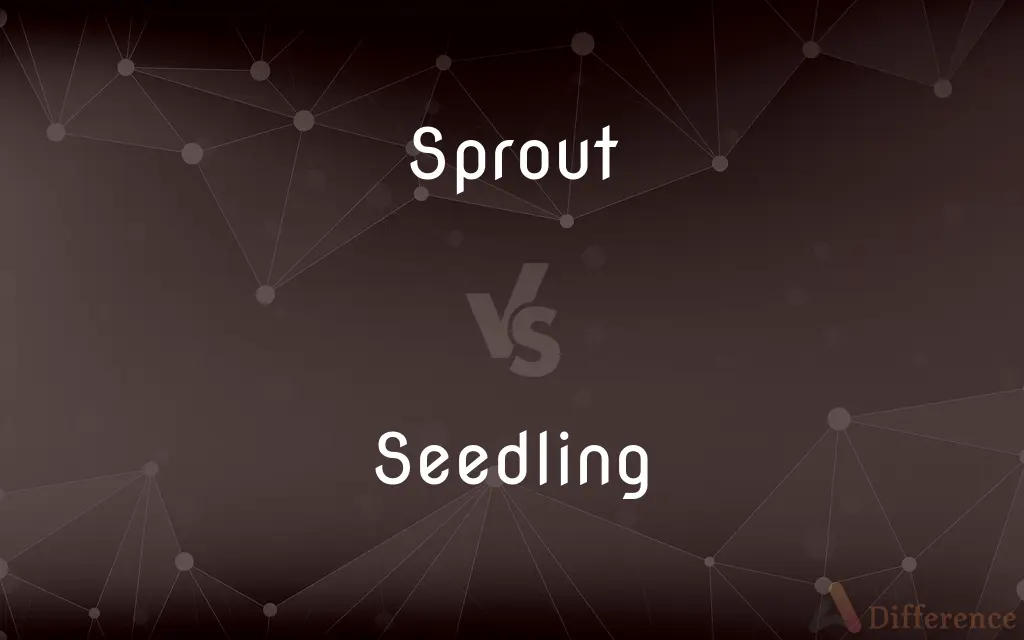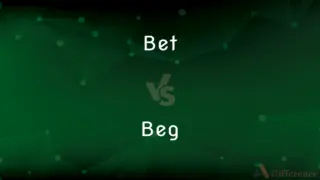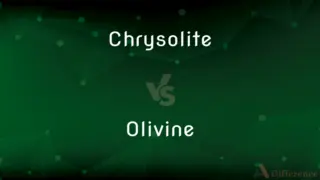Sprout vs. Seedling — What's the Difference?
Edited by Tayyaba Rehman — By Fiza Rafique — Updated on March 28, 2024
A sprout is the initial growth from a seed, characterized by the emergence of the embryonic root (radicle), while a seedling represents a more developed stage, featuring the first true leaves after the cotyledons (seed leaves).

Difference Between Sprout and Seedling
Table of Contents
ADVERTISEMENT
Key Differences
Sprouts are the earliest stage of a plant's life cycle, beginning when a seed first breaks dormancy and germinates. This process involves the seed's embryonic root, or radicle, breaking through the seed coat. At this point, the plant is focused on root development and establishing a base for nutrient absorption. In contrast, a seedling is a more advanced stage of growth where, after the sprout has developed its initial root system and a stem, the first true leaves emerge. These true leaves are critical for photosynthesis, the process by which plants convert light energy into chemical energy.
The environment required for sprouting and growing seedlings can differ significantly. Sprouts require a moist environment to break dormancy and begin growth, with little to no light needed initially. Seedlings, on the other hand, require not only continued moisture but also increased light to support photosynthesis. This shift marks a transition from relying on the seed's stored nutrients to generating energy through sunlight.
The nutritional content of sprouts and seedlings also differs, with sprouts being rich in enzymes, vitamins, and minerals necessary for the early stages of growth. As the plant develops into a seedling, it begins to produce more complex compounds, including chlorophyll, and the nutritional profile evolves to support its growing needs.
In gardening and agriculture, the distinction between sprouts and seedlings is important for understanding the care and conditions required at different growth stages. Sprouts are often more delicate and require careful handling to prevent damage to the embryonic root and shoot. Seedlings, while still delicate, are slightly more robust and begin to require additional care, such as thinning and transplanting, to ensure proper growth and development.
Both sprouts and seedlings are critical stages in a plant’s lifecycle, with each phase having specific requirements and challenges. Understanding these stages is crucial for successful plant growth, whether for agriculture, gardening, or commercial plant production.
ADVERTISEMENT
Comparison Chart
Definition
Initial growth from a seed, showing embryonic root (radicle) emergence
More developed stage with first true leaves
Stage
Earliest stage of plant life
Follows the sprout stage
Environment
Moist, little to no light required
Moist, requires light for photosynthesis
Focus
Root development and emergence
Development of true leaves and photosynthesis
Nutritional Content
Rich in enzymes, vitamins, minerals
Begins producing chlorophyll, complex compounds
Compare with Definitions
Sprout
Sprouts are the first growth from a seed, marked by root emergence.
The radicle broke through the seed coat, marking the sprout's emergence.
Seedling
Seedlings develop from sprouts, featuring the first true leaves.
The seedlings' true leaves began to unfold, ready for photosynthesis.
Sprout
Sprouts rely on the seed’s stored nutrients.
The sprouts grew rapidly, utilizing the energy stored within the seed.
Seedling
Seedlings mark the beginning of photosynthesis.
With their true leaves, the seedlings started converting sunlight into energy.
Sprout
They are delicate and need gentle handling.
The gardener carefully watered the sprouts to avoid damaging them.
Seedling
Seedlings are more robust than sprouts.
The young seedlings stood firm against the gentle breeze.
Sprout
They thrive in moist conditions without light initially.
Kept in darkness, the seeds quickly sprouted.
Seedling
They require light and continued moisture.
The seedlings were moved to a sunny spot to encourage growth.
Sprout
Sprouts are harvested early for their nutritional content.
Alfalfa sprouts are popular for their health benefits.
Seedling
Care includes thinning and transplanting.
She thinned the seedlings to prevent overcrowding.
Sprout
(of a plant) put out shoots
The weeds begin to sprout
Seedling
A seedling is a young sporophyte developing out of a plant embryo from a seed. Seedling development starts with germination of the seed.
Sprout
A shoot of a plant
The flower pots are full of green sprouts
Seedling
A young plant, especially one that grows from a seed, rather than from a cutting, for example.
Sprout
Short for Brussels sprout
Seedling
(botany) A young plant grown from seed.
Sprout
To begin to grow; give off shoots or buds.
Seedling
Any young plant, especially:
Sprout
To emerge and develop rapidly
Businesses that sprouted along the highway.
Seedling
One grown in a nursery for transplanting.
Sprout
To allow or cause to come forth and grow
He sprouted a mustache.
Seedling
A tree smaller than a sapling.
Sprout
Young plant growth, such as a bud or shoot.
Seedling
A plant reared from the seed, as distinguished from one propagated by layers, buds, or the like.
Sprout
Something resembling or suggestive of a sprout, as in rapid growth
"a tall blond sprout of a boy" (Anne Tyler).
Seedling
Young plant or tree grown from a seed
Sprout
The young shoots of plants such as alfalfa and soybean, usually eaten raw.
Sprout
Brussels sprouts.
Sprout
A new growth on a plant, whether from seed or other parts.
Sprout
A child.
Oh my, how your sprouts have grown!
Sprout
A Brussels sprout.
In our family we eat sprouts but once a year, on Christmas.
Sprout
A bean sprout.
Sprout
An edible germinated seed.
Sprout
To grow from seed; to germinate.
The crocuses should be sprouting after 2 months, provided they're well tended.
Sprout
(transitive) To cause to grow from a seed.
I sprouted beans and radishes and put them in my salad.
Sprout
(transitive) To deprive of sprouts.
To sprout potatoes
Sprout
(intransitive) To emerge from the ground as sprouts.
Sprout
To emerge haphazardly from a surface.
Whiskers sprouted from the old man's chin.
Sprout
To emerge or appear haphazardly
A lot of coffee shops have sprouted up in this neighbourhood since the block of flats was put up.
Sprout
To shoot, as the seed of a plant; to germinate; to push out new shoots; hence, to grow like shoots of plants.
Sprout
To shoot into ramifications.
Sprout
To cause to sprout; as, the rain will sprout the seed.
Sprout
To deprive of sprouts; as, to sprout potatoes.
Sprout
The shoot of a plant; a shoot from the seed, from the stump, or from the root or tuber, of a plant or tree; more rarely, a shoot from the stem of a plant, or the end of a branch.
Sprout
Young coleworts; Brussels sprouts.
Sprout
Any new growth of a plant such as a new branch or a bud
Sprout
A newly grown bud (especially from a germinating seed)
Sprout
Produce buds, branches, or germinate;
The potatoes sprouted
Sprout
Put forth and grow sprouts or shoots;
The plant sprouted early this year
Common Curiosities
What is the difference between a sprout and a seedling?
Sprouts are the initial growth from a seed, focusing on root development, whereas seedlings are more developed and begin photosynthesis.
Can you eat both sprouts and seedlings?
Yes, both can be edible, but sprouts are more commonly consumed, especially in salads and sandwiches.
How do you know when a sprout becomes a seedling?
A sprout becomes a seedling once it develops its first true leaves after the cotyledons.
How long does it take for a sprout to become a seedling?
The time varies by plant species but typically ranges from a few days to a couple of weeks.
Are sprouts more nutritious than seedlings?
Sprouts are rich in enzymes and nutrients necessary for early growth, but the nutritional value changes as the plant develops into a seedling.
Do sprouts and seedlings require the same conditions to grow?
No, sprouts primarily need moisture and minimal light, while seedlings require both moisture and sunlight.
Why are true leaves important for a seedling?
True leaves are crucial for photosynthesis, allowing the plant to produce its own food from light.
What care do seedlings need?
Seedlings need proper light, moisture, and sometimes thinning and transplanting for optimal growth.
Can all seeds become sprouts and seedlings?
Most seeds can sprout and develop into seedlings if given the appropriate conditions, but germination rates vary.
What's the significance of the cotyledons?
Cotyledons provide the initial nutrients for sprouts before the development of true leaves and photosynthesis.
When should seedlings be transplanted?
Seedlings should be transplanted when they are robust enough to handle the move, typically after developing several true leaves.
How can you improve the success rate of growing seedlings from sprouts?
Providing the right balance of moisture, light, and temperature can significantly improve the success rate.
How do environmental factors affect the growth of sprouts and seedlings?
Factors like temperature, humidity, and light intensity can greatly influence the growth rate and health of sprouts and seedlings.
Do sprouts need soil to grow?
Sprouts don't necessarily need soil and can be germinated in water or moist paper towels.
Why is it important to thin seedlings?
Thinning seedlings prevents overcrowding, ensuring each plant has enough space and resources to grow properly.
Share Your Discovery

Previous Comparison
Bet vs. Beg
Next Comparison
Chrysolite vs. OlivineAuthor Spotlight
Written by
Fiza RafiqueFiza Rafique is a skilled content writer at AskDifference.com, where she meticulously refines and enhances written pieces. Drawing from her vast editorial expertise, Fiza ensures clarity, accuracy, and precision in every article. Passionate about language, she continually seeks to elevate the quality of content for readers worldwide.
Edited by
Tayyaba RehmanTayyaba Rehman is a distinguished writer, currently serving as a primary contributor to askdifference.com. As a researcher in semantics and etymology, Tayyaba's passion for the complexity of languages and their distinctions has found a perfect home on the platform. Tayyaba delves into the intricacies of language, distinguishing between commonly confused words and phrases, thereby providing clarity for readers worldwide.















































